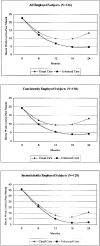The effect of improving primary care depression management on employee absenteeism and productivity. A randomized trial
- PMID: 15550800
- PMCID: PMC1350979
- DOI: 10.1097/00005650-200412000-00007
The effect of improving primary care depression management on employee absenteeism and productivity. A randomized trial
Abstract
Objective: To test whether an intervention to improve primary care depression management significantly improves productivity at work and absenteeism over 2 years.
Setting and subjects: Twelve community primary care practices recruiting depressed primary care patients identified in a previsit screening.
Research design: Practices were stratified by depression treatment patterns before randomization to enhanced or usual care. After delivering brief training, enhanced care clinicians provided improved depression management over 24 months. The research team evaluated productivity and absenteeism at baseline, 6, 12, 18, and 24 months in 326 patients who reported full-or part-time work at one or more completed waves.
Results: Employed patients in the enhanced care condition reported 6.1% greater productivity and 22.8% less absenteeism over 2 years. Consistent with its impact on depression severity and emotional role functioning, intervention effects were more observable in consistently employed subjects where the intervention improved productivity by 8.2% over 2 years at an estimated annual value of US 1982 dollars per depressed full-time equivalent and reduced absenteeism by 28.4% or 12.3 days over 2 years at an estimated annual value of US 619 dollars per depressed full-time equivalent.
Conclusions: This trial, which is the first to our knowledge to demonstrate that improving the quality of care for any chronic disease has positive consequences for productivity and absenteeism, encourages formal cost-benefit research to assess the potential return-on-investment employers of stable workforces can realize from using their purchasing power to encourage better depression treatment for their employees.
Figures
References
-
- Druss BG, Marcus SC, Olfson M, et al. Comparing the national economic burden of five chronic conditions. Health Aff. 2001;20:233–241. - PubMed
-
- Kessler RC, Frank RG. The impact of psychiatric disorders on work loss days. Psychol Med. 1997;27:861–873. - PubMed
-
- Kessler RC, Barber C, Birnbaum HG, et al. Depression in the workplace: effects on short-term disability. Health Aff. 1999;18:163–171. - PubMed
-
- Kessler RC, Mickelson KD, Barber C, et al. The effects of chronic medical conditions on work impairment. In: Rossi AS, editor. Caring and Doing for Others: Social Responsibility in the Domains of the Family, Work and Community. University of Chicago Press; Chicago: 1999.
-
- Greenberg PE, Kessler RC, Nells TL, et al. Depression in the workplace: an economic perspective. In: Feighner JP, Boyer WF, editors. Selective Serotonin Re-Uptake Inhibitors: Advances in Basic Research and Clinical Practice. John Wiley & Sons, Ltd.; Chichester, West Sussex, UK: 1996.
Publication types
MeSH terms
Substances
Grants and funding
LinkOut - more resources
Full Text Sources
Medical




